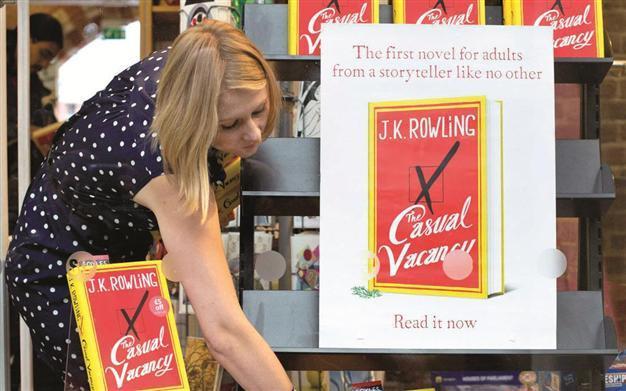Rowling publishes first adult novel
LONDON - Reuters

J K Rowling’s first adult fiction book ‘The Casual Vacancy’ went on sale yesterday.
J.K. Rowling’s first foray into adult fiction was bound to be compared to her wildly successful Harry Potter series, and, while “The Casual Vacancy” has earned mixed reviews, for some critics the magic has worn off.
The Casual Vacancy, which hits the shelves on yesterday, looks destined for the top of the bestseller lists whatever the reaction, with Rowling’s celebrity status guaranteeing public anticipation and media attention in equal measure.
In the New York Times, Michiko Kakutani likened some of Rowling’s small-minded, snobby characters to the odious Dursley family from the Harry Potter tales.
“One can only admire her gumption in facing up to the overwhelming expectations created by the global phenomenon that was Harry Potter,” Kakutani wrote. “Unfortunately, the real-life world she has limned in these pages is so willfully banal, so depressingly cliched that ‘The Casual Vacancy’ is not only disappointing, it is dull.”
Other critics were less damning, however, and several reviews in British and U.S. newspapers argued that, while not great, Rowling’s eagerly anticipated break from the world of child wizards and witches was good.
“The Casual Vacancy is no masterpiece, but it’s not bad at all: intelligent, workmanlike, and often funny,” said Theo Tait in the Guardian newspaper.
Worth the hype? “The Casual Vacancy” is set in a small English town called Pagford, where class prejudices are played out and Rowling exploits her post-Potter freedom by tackling themes of drug addiction, teenage sex and violent domestic abuse.
Andrew Losowsky of the Huffington Post website, said Rowling’s foray into adult fiction was worth publishing, but perhaps did not match the giddy anticipation surrounding its release.
“Would this book be published if it weren’t for the name on the cover? Almost certainly. Would anyone pay much attention to it, and its message? Probably not.”
